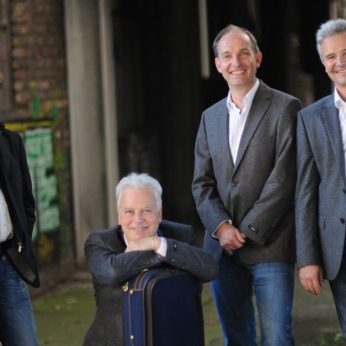This work must be the best loved quartet ever written; Dvorák’s vision of inspired simplicity and enchanting melodies has proved irresistible to audiences ever since its first performance. It was composed in barely two weeks during his first visit to America, whither he had been invited by the philanthropist Jeanette Thurber to help set up a school for American composition in her New York National Conservatory. Once Dvorák arrived in New York, he went out of his way to praise the qualities of what he evidently felt was Native American music, namely the plantation songs and spirituals. He described them as tender, passionate, melancholy, solemn, religious, bold, merry, gay, indeed every emotion a composer could need. So he wrote a work that would set his American students and audience an example of simplicity of form combined with melodic generosity.
He created this miracle of tunefulness in the little Czech settlement of Spillville in the north-east corner of Iowa, eleven miles from the nearest railway station, where he spent the summer of 1893 with his family, who had travelled from Europe to be with him. The atmosphere at Spillville clearly agreed with him as the quartet was composed almost as soon as he arrived and with the utmost facility. Much has been made of Dvo?ák’s use of pentatonic melody – a theme that avoids the fourth and seventh degrees of the major scale – as showing the influence of the Negro spirituals on his compositional style, but the pentatonic scale was not a new feature of his music and can be found throughout his works.
The first bars are pure magic, where the gentle rustle of the violins and the rhythmic pointing by the cello introduces the main theme. The fluency of this opening keeps propelling the music forward throughout the movement – apart from the wonderful interludes arising from the lyrically reflective second subject. As in much of Dvorák’s chamber music, he gives the rich voice of his own instrument, the viola, a pre-eminent role. Above all, this is happy, life-affirming music, a joy for performer and listener alike.
The slow movement is famous for the eloquence of its poignant tune, full of the nostalgia of the exile. Rarely did Dvorák achieve so deep an intensity of expression as in the soaring phrases of this movement’s ecstatic theme, while all the time the rocking figure of the accompaniment cradles the emotional impact of the melody as if comforting a distressed child. Certainly he knew only too well the power his music had to soften the cacophonous blows of city life and the pain of exile.
The open-air good humour of the third movement is notorious for the new addition to the aviary of classical music – the incessant rapid song of the scarlet tanager that distracted him during his walks at Spillville is slipped in as a subsidiary theme. The cheerful main theme gets to appear in nineteen versions, showing how a small amount of material can be made to go a long way. The Rondo finale is even more high-spirited and also gives the impression of being monothematic, so catchy is the main rondo theme. There is a charming chorale-like episode, which is said to call to mind the composer’s efforts on the organ at morning mass in the church at Spillville. The work ends with triumphant flourishes as Dvorák races to his final conclusion.
